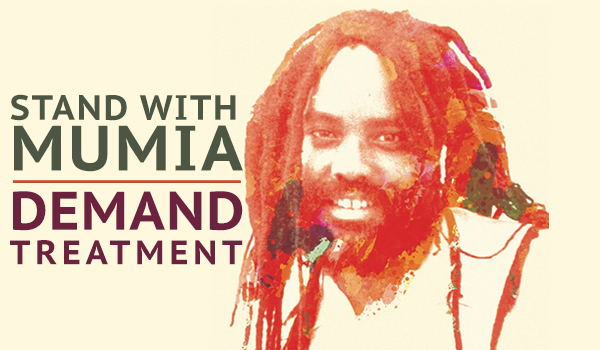On September 7th, 2016 activists are holding a day of actions in reaction to Mumia Abu-Jamal being denied life saving treatment for the Hepatitis C Virus (HCV). At 11am they are holding a press conference outside the Philadelphia Health Center at S. Broad & Lombard, at 1pm they are rallying outside Governor Wolf’s office at 200 S. Broad, and at 3pm they are rallying outside District Attorney Seth William’s office across the street from the southeast corner of City Hall.

Mumia Abu-Jamal is a former Black Panther and a journalist who has been in prison in Pennsylvania since 1981, when he was convicted of killing a police officer. He has consistently maintained his innocence over the past three decades. After 30 years on death row, his conviction was overturned and he was resentenced to life in prison. In 2015, Mumia sued the state of Pennsylvania to receive treatment for the hepatitis C virus (HCV) after he was hospitalized. He was denied HCV treatment because he was not yet sick enough to meet the treatment guidelines.
Last week, U.S. District Court Judge Robert Mariani denied Mumia’s motion for a preliminary injunction on a technicality, because the lawsuit did not name the state’s hepatitis C committee for prisoner treatment. Mumia’s lawyer argued that this committee did not exist when the lawsuit was filed.
Although Judge Mariani denied Mumia’s motion for HCV treatment, he did find that Pennsylvania’s protocol for treating HCV in prisons fails to meet constitutional standards. Pennsylvania only treats about 5 of the more than 6,000 incarcerated people living with HCV.
One of the significant reasons for prisons restricting access to HCV treatment is the price of the medications. Medicaid and private insurers are also often restricting access to the lifesaving treatment due to its high price tag. In 2013, Gilead Sciences released the first of a new series of HCV treatments which have cure rates above 90%, but the company set the price at $1,000 a pill or $84,000 for a 12 week course of treatment. Since then, other medications have come to market from both Gilead as well as other big pharmaceutical corporations, somewhat driving down the price. However these medications continue to be exorbitantly expensive, and prison systems have set narrow treatment guidelines to restrict the amount of money they need to spend on curing people living with HCV.
The prison system in the United States is failing to properly address the significant amount of hepatitis C cases among incarcerated people. Prisons have a high prevalence rate of hepatitis C with one study by the American Correctional Association (ACA) finding between 8% and 17% of people tested positive for the hepatitis C virus. Earlier studies, mentioned in the ACA report had found prevalence as high as 30%. The United States prison industrial complex has a disproportionate impact on people of color, particularly African Americans. Nationwide, 1 in 3 black men will be incarcerated at some point in their lives. Similarly, HCV infection is more prevalent among African Americans than any other racial group representing about 22% of the estimated Americans with chronic HCV.
Pennsylvania is not the only state facing lawsuits over HCV treatment. There are also lawsuits in Tennessee, Massachusetts, and Minnesota. New York State is doing a bit better than others with about a 350% increase in funding to provide HCV treatment, which allowed another former Black Panther, Robert Seth Hayes, to be cured.
HCV causes liver inflammation which can eventually leads to liver scarring, cancer, and death. There are many reasons that the prevalence of HCV infection is so high in our nation’s prisons. Racial profiling, heavy-handed ‘broken windows’ policing and punitive drug laws have resulted in skyrocketing prison populations with a disproportional prevalence of people who use drugs and people of color being incarcerated. 80 – 90% of the people incarcerated for using drugs are African American in some states, even though rates of drug use, possession, and sales are similar among white people. Using drugs, particularly injecting drugs, is the biggest risk factor for HCV transmission. It is possible to prevent the transmission of HCV using harm reduction interventions such as distributing condoms and safer drug using supplies. Despite the public health benefits and cost-effectiveness of harm reduction interventions, prisons and other places of detention, US prisons overwhelming ignore the evidence for syringe access, methadone, condoms programs. Denial of basic health-care, whether in the community or in prisons (and other places of detention) is both cruel and inhumane and a denial of the human right to health, a legally binding human rights obligation.
“As drug control enforcement fuels rising incarceration rates, overburdened prison systems are unable to provide acceptable standards of care and living in both pre and post conviction environments. Conditions such as overcrowding, denial of essential medical services—including harm reduction—create an environment where cruel, inhuman, and degrading treatment is more likely to occur”. United Nations Special Rapporteur on the right to health.
The provision of harm reduction interventions, including HCV treatment, is not a policy option but constitute a legal human rights obligation for countries to progressively realize the right to health.
